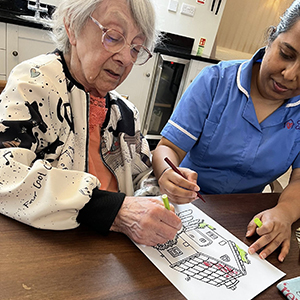As we grow older, it's natural to experience some changes in memory and thinking — this is part of normal ageing. However, when these changes begin to interfere with everyday life — such as managing finances, keeping track of appointments, or following conversations — it may be a sign of something more serious, like dementia. If you or someone you care about is noticing these changes, it's important to speak with your GP and involve family or trusted friends early. Getting the right support and guidance can make a meaningful difference.
Dementia is a broad term used to describe a group of progressive conditions that affect the brain, leading to difficulties with memory, thinking, communication, and daily functioning. While some cognitive changes are a normal part of ageing, dementia is not. It occurs when brain cells are damaged by disease, and symptoms begin to interfere with everyday life — such as managing tasks, making decisions, or recognising familiar people and places.
The most common types of dementia in the UK include Alzheimer’s disease, which accounts for around 60–70% of cases, vascular dementia, dementia with Lewy bodies, and frontotemporal dementia. Mixed dementia, where more than one type is present, is also common. Today, nearly 1 million people in the UK are living with dementia, and this number is expected to rise to 1.4 million by 2040. Early diagnosis and support can make a significant difference in helping people live well with dementia.

Dementia affects each person differently, but it often begins with subtle changes in memory, thinking, and communication. Over time, these changes can impact daily life — making it harder to follow conversations, remember appointments, or carry out familiar tasks. People may feel confused, anxious, or frustrated as they struggle to make sense of their surroundings. Dementia can also affect mood, behaviour, and relationships, sometimes leading to withdrawal or changes in personality. Despite these challenges, many people with dementia continue to live fulfilling lives, especially when supported by understanding care, meaningful activities, and a safe, structured environment. At Country Court Care we focus on the person behind the diagnosis, tailoring our care to their unique needs, preferences, and life story.
The symptoms of dementia usually worsen gradually over time. Each person may progress through the stages of dementia differently, depending on what area of the brain is affected.

Because the causes and types vary, dementia looks slightly different for everyone. Here’s how dementia may affect you:

When someone is diagnosed with dementia, it can have a profound emotional and practical impact on their family and friends. Loved ones often find themselves adjusting to new roles — becoming carers, advocates, and companions — while navigating feelings of grief, stress, and uncertainty. Relationships may change as communication becomes more challenging and familiar routines shift. It’s common for families to feel overwhelmed, especially as the condition progresses and care needs increase. However, with the right support, education, and guidance, families can find strength, connection, and resilience. At Country Court, we’re here not just for the person living with dementia, but for those who love and care for them — offering advice, emotional support, and a community that understands.

We understand that moving a loved one into a care home is a deeply emotional decision — one that can feel overwhelming and filled with uncertainty. At Country Court, we’re here to support you every step of the way, offering guidance, compassion, and personalised care that honours your loved one’s dignity and individuality. Our motto, “Our family, caring for yours,” is more than just words — it’s a commitment we live by every day in our homes.
For more information about dementia care at Country Court Care, please don’t hesitate to contact us on 01733 571 951. We’re here to listen, help, and welcome you into our extended family.